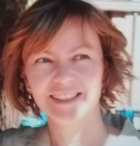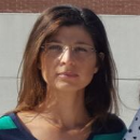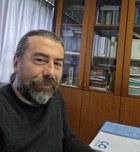Faculty members

Maria Laura Bolognesi
Coordinator of the course
Medicinal Chemistry
MARIA LAURA BOLOGNESI obtained a Master in Pharmaceutical Chemistry and Technology from the Alma Mater - University of Bologna in 1990, and in Pharmacy in 1992. In 1991 she joined Sigma Tau Pharmaceutical Industries, Rome, as a Research Scientist. In 1996, she earned a Ph.D. in Pharmaceutical Sciences from the University of Bologna under the mentorship of Prof. Carlo Melchiorre. After postdoctoral studies at University of Minnesota in Prof. Philip Portoghese’s laboratory, she returned to the University of Bologna, where she is currently Full Professor of Medicinal Chemistry, Director of the B2F2 PhD program, Vice-Director of Interdepartmental Centre for Industrial Research in Health Sciences & Technologies, and Rector Delegate for Latin America International Relations.
In 2009, she was selected as a Distinguished Visiting Professor at Universidad Complutense de Madrid (Spain) and an Enseignante invitée at the Université de Caen Normandie in 2018.For the 2014-2017 period,Maria Laura was awarded a Special Visiting Researcher scholarship by the Brazilian government through Brazil’s Science without Borders program.
She is currently an Associate Editor of Journal of Medicinal Chemistry and sits on the editorial committees of several medicinal chemistry journals, such as ChemMedChem, Chemical Biology and Drug design, Future Medicinal Chemistry, Current Topics in Medicinal Chemistry. Maria-Laura also serves on the Advisory Board of the European Federation of Medicinal Chemistry.
Her research spans the design, synthesis and pharmacological investigation of small molecules in the neurodegenerative and neglected tropical disease therapeutic areas. She has a track record of more than 160 publications in high-ranked journals (h index = 42, Feb 2020), including patents and patent applications, and more than 70 invited talks worldwide.

Anna Minarini
Anna Minarini is currently Associate Professor of Medicinal Chemistry in the Department of Pharmacy and Biotechnology at the University of Bologna. She graduated in Pharmaceutical Chemistry and Technology from the University of Bologna, in 1987 and received her Ph.D. in Pharmaceutical Sciences in 1992 from the same institution. In 1990−1991, as a part of her Ph.D. program, she was a Visiting Researcher inD. J.Triggle’s laboratory at University of Buffalo (NY, U.S.). For the next six years she was Assistant Professor in the Department of Pharmaceutical Sciences at University of Bologna. From 1998she is Associate Professor at theUniversity of Bologna where she teaches the courses of Medicinal Chemistry and Drug Analysis. From2005 to 2012, she was also a member of the Board of University of Bologna.Her research mainly focused on the development of selective antagonists for studying muscarinic and-adrenergic receptors. Her current research interest concerns the design and synthesis of small molecules to treat and studychronic degenerative diseases, such as cancer and Alzheimer. The results of this research have been the subject of 102 publications, including original articles, patents, and books.

Marinella Roberti
Medicinal Chemistry
Marinella Roberti is Associate Professor of Medicinal Chemistryat the Department of Pharmacy and Biotechnology,University of Bologna. Shegraduated with honors inPharmacy at the University of Bologna in 1986. As a part of her postgraduate training, she spent some years as a research fellow in Italian and American Institutions (University of Perugia, and Mayo Clinic of Jacksonville, FL. USA).
Her research field regards the design and the synthesis of biologically actives small molecules which can be eitherinnovative lead candidates or valuable chemical tools to study molecular pathways. Her expertise ranges from the classical asymmetric synthesis of natural compounds to the most innovative synthesis of libraries of natural-like compounds. The therapeutic fields of main interest is cancer.

Barbara Luppi
Barbara Luppi is Associate Professor at the Department of Pharmacy and Biotechnology, Bologna University. The main research topic is the development of non-conventional dosage forms such as thin films, inserts, micro/nanoparticles and liposomes, obtained by suitable productive processes (solvent casting, freeze/spray drying, ionic gelation and thin film hydration), for the delivery of Active Pharmaceutical Ingredients (APIs), health-promoting bacteria and natural molecules. More recently, her research has focused on the use of biosurfactants produced by lactobacilli as new green excipients with multifunctional properties. She collaborates with international research groups and she is author of more than 60 international publications, 3 patents, 3 contributions to textbooks and more than 70 contributions to national and international conferences.

Manuela Bartolini
Biopharmaceutical and Pharmaceutical Analysis
Manuela Bartolini got her master's degree in Pharmaceutical Chemistry and Technology at the University of Bologna in 1998 and in 2003 she defended her PhD thesis. Since September 2014, she is Associate Professor at the Department of Pharmacy and Biotechnology of the University of Bologna (Italy). As research training, Prof. Bartolini spent research periods at the Laboratory of Clinical Investigations, Gerontology Research Center - National Institutes of Health, Baltimore, USA (08-2001 to 04-2002) and at the Laboratory of Analytical Chemistry, Geneva University, Switzerland (2006). Main research interests of Prof. Bartolini are (i) the study of biorecognition phenomena involving targets of pharmaceutical interest with particular focus on Alzheimer’s Disease, diabetes and colon cancer; (ii) the development of in vitro analytical approaches for application in drug discovery; (iii) development of enzyme-based microreactors for application in drug discovery, proteomics and glycomics.
Prof. Bartolini has established numerous international collaborations resulting in joint articles in high-impact factor peer-reviewed articles. Since 2014 she is member of the scientific and organizing committee of the Summer School on Pharmaceutical Analysis (SSPA); she is also member of the scientific committee of the international meeting on Recent Developments in Pharmaceutical analysis (since 2017), of the international symposium “Monolith Summer School and Symposium” (MSS) (since 2018) and of the MS Pharmaday congress (since 2018). Prof. Bartolinicurrently is member of the Expert Review Panel – Life Science at the National Science Centre in Krakov (Poland).
Prof. Bartolini is the author of 110 papers on peer-reviewed international journals, 2 chapters in books (ILM Publications and Società Editrice Esclulapio) and 2 international patents and several oral communications at international congresses. She is member of the editorial board of Chromatographia (Springer). Her h-index is 42 (Scopus) and her published papers have been cited more than 5300 times (Scopus).

Monica Forni
Professore associato di Fisiologia Veterinaria dal 2001.
Si occupa di biologia delle cellule endoteliali e dei precursori staminali vascolari studiando le basi della fisiologia dello stress cellulare mediante modelli animali in vivo, ex vivo ed in vitro.
Responsabile del Servizio di Bioscienze e Biotecnologie del Dipartimento di Scienze Mediche Veterinarie.
Membro del CIRI Scienze della vita e tecnologie per la salute
Associate professor in Veterinary Physiology since 2001.
The main research field is the biology of endothelial cells and of vascular precursors stem cells related to cell stress physiology in in vivo, ex vivo and in vitro animal models.
Head of Bioscience and Biotechnology Service of Dipartimento di Scienze Mediche Veterinarie.
Member of CIRI - Life Sciences and Technologies for Health.

Nadia Passerini
Nadia Passerini is Associate Professor of Pharmaceutical Technology at the University of Bologna (Italy). She obtained the Degree in Pharmaceutical Chemistry and Technology at the University of Bologna in 1992 and the PhD in Pharmaceutical Science in 1997. In 1997 she spent four months as visiting scientist at the School of Pharmacy, University of London (UK) working in the group of Prof. D. Craig. In 1998 she won a one-year post-doctoral fellowship (Marie Curie Grant) at The School of Pharmacy, The Queen's University of Belfast (UK) where she worked again in the research group of Prof. D. Craig. From 1999 to 2014 she was lecturer, and from September 2014 she is Associate Professor of Pharmaceutical Technology at the University of Bologna.
Her research focus on the study of drug delivery systems, developing new technologies and new apparatus for the production of solid dosage forms (microparticles, granules and tablets) which can optimize the biovailability of drugs according to the specific needs of the therapy. Furthermore, she is interested in the solid state characterization (DSC, HSM, FT-IR, XRD, SEM) of the obtained drug delivery systems to correlate their physicochemical properties to the in vitro release of drugs. Currently her research focus on the formulation, production and characterization of microparticles producted by the spray congealing technology, on the development and optimization of granulation and coating processes and on the development of pediatric formulations.

Patrizia Hrelia
Pharmacology and Toxicology
Full Professor of Pharmacology and Toxicology (since 2001).
MS in Medicinal Chemistry (1981), Ph.D. in Cell Biology (1986) from the University of Bologna.
Visiting Assistant Professor (1987-1988), Adjunct Associate Professor (1991-201 1) and Adjunct Professor (2011-2014) to the Department of Preventive Medicine and Community Health, the University of Texas Medical Branch, Galveston (TX) USA.
She began her carrier at the University of Bologna as Assistant Professor (1990-1998), Associate Professor (1998-2001).
Director of the post-graduate School in Toxicology (2003-2005), Head of the Department of Pharmacology (2009-2012).
Coordinator of the PhD Program in Pharmacology and Toxicology, Human Development and Movement Sciences, University of Bologna (since 2013).
The research philosophy is a multidisciplinary approach to problems of preventive and traslational medicine.
The research is guided by three main objectives, which characterize the scientific mission, namely:
1) Multifunctional therapeutic strategies for chemoprevention of cancer and neuroprotection
The principal task is to identify new preventive strategies for the reduction of risk factors associated to chronic degenerative diseases, such as cancer and neurodegeneration. The first contribution is the identification of critical biological targets and the understanding of the events with a pivotal role in cancer and the age‐associated neuronal loss in neurodegenerative diseases. The search is toward active chemopreventive and neuroprotective drugs that would prevent the progression of degenerative diseases, through the manipulation of endogenous cellular defense mechanisms by chemical inducers.
In the context of neurodegenerative diseases, multipotent agents are exercised against the cascade of events leading to neurodegeneration in neurodegenerative diseases to identify the therapeutic window of activity.
2) Development of new cellular and molecular approaches in vitro and in vivo to detect and quantify the global cellular response to toxic stress, including measurements of apoptosis, specific metabolic capabilities and cell cycle effects, the activation of cellular death/survival biochemical pathways, miRNA analysis, to improve the identification of new preventive agents.
3) Development of methods based on biomarker analysis to improve assessment of human early biological response, susceptibility and risk and to determine the association with diet, cancer, ageing and genetic profiles. Definition of the scientific basis for the development of new diagnostic methodologies and novel therapeutic strategies.

Patrizia Romualdi
Molecular Neuroscience and Neuropharmacology
Patrizia Romualdi is Associate Professor in Pharmacology (BIO/14) since 2001 at the Department of Pharmacology and from 2012 at the Department of Pharmacy and Biotechnology.
Patrizia Romualdi graduated with Honors in Pharmacy at the University of Bologna in 1982. She was selected for a fellowship from Farmindustria in the years 1983, 1984 e 1985 and in December 1985 she was awarded by The Rotary Foundationt of the Rotary International with a fellowship to spend a year in USA. She moved to the Uniformed Services of the Health Sciences in Bethesda USA to work with Prof. Brian M. Cox (the discoverer of the endogenous opioid beta-endorphin), where she was then enrolledas an employee of the American governmentat USUHS until the end of 1987. She then achieved the Ph.D. degree in Pharmaceutical Sciences at the University of Bologna in 1990 under the supervision of Prof. Sergio Ferri and working on the molecular mechanisms underlying the role of the endogenous opioid peptides in several CNS functions, both in in vivo and in vitro models.
On October 1990 she started her independent career at the Institute of Pharmacology of the University of Bologna , as Researcher (Assistant Professor). From 2001 she is Associate Professor of Pharmacologyat the Department of Pharmacology: now, since 2012, she is part of the Department of Pharmacy and Biotechnology. She has been member of the Academic Board of the PhD in Pharmacology and Toxicology since 2001. Now, she is a member of the Academic Board of the PhD inBiotechnological, Biocomputational, Pharmaceutical and Pharmacological Sciences.
The main research interests focus on the regulation of gene expression in vitro and in vivo, with particular interest in transcriptional regulation of neuropeptides, opioids in relation to pathological conditions, such as chronic pain, substance use disorders, neurodegenerative diseases, epilepsy. Her research contributed to the identification of common pathways in the mesolimbic-cortical brain regions involving the opioid system and activated by different drugs of abuse, such as opiates, cocaine, methamphetamines, MDMA and alcohol.
In recent years, her research activity has focused on the study of the epigenetic mechanisms regulating gene expression of several endogenous neuropeptides in pathological conditions such as chronic pain, substance use disorders, neurodegenerative diseases. In particular, the DNA methylation and the histone modifications have been investigated using in vitro and in vivo models of diseases. Moreover, the involvement of proteasome 26S in pain and drug abuse has been established by the study of gene expression regulation of the specific subunits and by measurements of 26S catalytic activity.
She has authored 107 papers on international journals as well as several book chapters.
She has tutored more than 100 Laurea and 30 Doctorate theses.
She has given several talks at Italian universities and foreign academic institutions , national congresses and international conferences .
Visiting Professor in 1992 at the NIH, Bethesda USA, at the Semmelweiss University School of Medicine (in 1996) in Budapest, Hungary, where in 2012 she was awarded the titol of Sodalem Honoris Causa of the Hungarian Academy of Science and she became an Onorary Member of the Hungarian Society of Clinical and Experimental Pharmacology .
She has contributed to several national and international research programs with funds from public and private sources.

Pier Luigi Martelli
Computational Biology and Bioinformatics
LM got the PhD in Physics in 2001 at the University of Bologna.
He is Associate Professor in Biochemistry since 2015 and he coordinates the International Master in Bioinformatics.
His research interests are focused on the development of tools based on machine learning approaches for the prediction of structural and functional features of biological macromolecules starting from sequences (see http://biocomp.unibo.it/predictors).
See http://biocomp.unibo.it/gigi/CVlastEN.pdf for a complete CV.

Roberto Gotti
Biopharmaceutical and Pharmaceutical Analysis
Associate professor in Medicinal Chemistry (CHIM/08) at the Department of Pharmacy and Biotechnology. The research interests are related to the general field of pharmaceutical and biomedical analysis with main focus on sample preparation (solid phase extraction SPE, solid phase microextraction SPME) and separation techniques (LC, GC and Capillary Electrophoresis) also hyphenated to mass spectrometry. Applications of original separation methods are addressed to bioactive small molecules with emphasis on chiral compounds in pharma-, food and environmental samples. Author of more than 120 scientific publications and member of the Editorial Board of The Journal of Pharmaceutical and Biomedical Analysis (Elsevier).

Stefano Iotti
Prof. Stefano Iotti, currently works at Department of Pharmacy and Biotechnology of the University of Bologna coordinating the research group of Molecular Imaging, Biosensors and Cell Biology. He has co-authored more then 100 publications which garnered > 2900 citations (H-index=31) and more than 700 impact points. He is also co-inventor of 6 patents. He has contributed to the development of in vivo NMR spectroscopy in basic research and in diagnostic applications. His scientific activity ranged from organic and physical chemistry to biochemical thermodynamics. He contributed to the development ofa novel approach to simplify the treatment of the thermodynamics of complex systems.At present the research activity is devoted to the study of cell metabolism combining synchrotron X-ray fluorescence and the use of a novel class of fluorescent chemo-sensors.
He is Member of the National Institute of Biostructure and Biosystemsand has beenMember of the European Technology Platform on NanoMedicine. He has been appointed President of the Organizing Committee of the European Magnesium Meeting 2011 and to the International Society for the Development of Research on Magnesium Society Board. He is member of the Editorial Board of the international journals Magnesium Research and International Journal of Molecular Sciences. He gained a special mention from the international journal Account of Chemical Research.

Alessandra Bisi
Medicinal Chemistry
Alessandra Bisi is currently Associate Professor of Medicinal Chemistry in the Department of Pharmacy and Biotechnology at the University of Bologna. She graduated with honours in Pharmaceutical Chemistry and Technology from the Alma Mater - University of Bologna in 1988 and received her Ph.D. in Pharmaceutical Sciences in 1993 from the same institution. In 1991, as a part of her Ph.D. program, she spent nine months in the Robin Ganellin’s laboratory at the University College of London (UCL, London, UK). From 1994 to 2001 she was Assistant Professor in the Department of Pharmaceutical Sciences at University of Bologna. From 2002 she is Associate professor of the same university.
Her research activity is focused on the design and synthesis of bioactive small molecules, mainly bearing oxa- and aza-heterocyclic cores. In particular, the backbones of xanthones, flavones, chalcones and coumarins, identified as natural-derived privileged structures, when appropriately decorated, led to the discovery of valuable drug candidates for the treatment of cancer, neurodegenerative diseases and neglected tropical diseases. In the last years, the multitarget approach has been applied to the drug design efforts, resulting in the identification of bioactive small molecules able to simultaneously affect different pathways involved in multifactorial pathologies. The results of these researches have been the subject of 109 publications in high-ranked journals (h-index 35, 3500 citations).

Silvia Turroni
Associate Professor in Chemistry and Biotechnology of Fermentation, at the Unit of Microbiome Science and Biotechnology, Dept. Pharmacy and Biotechnology, University of Bologna (Bologna, Italy). She has over 15 years of experience in the compositional and functional profiling of the human microbiome and the exploration of its impact on health. She has strong expertise on next-generation sequencing technologies, including 16S rRNA gene sequencing and omics approaches, i.e., metagenomics, metatranscriptomics and, more recently, culturomics, as well as on microbiome-host interaction studies in ex vivo models. Her research activity is documented by >170 publications in international peer-reviewed journals and >150 participations in national and international congresses (of which >65 as invited speaker).

Emil Malucelli
Associate Professor in Clinical Biochemistry at the Department of Pharmacy and Biotechnology at the University of Bologna. She graduated in Information Technology from the Alma Mater - University of Bologna in 2002 and earned his Ph.D. in Biochemistry in 2007 from the same institution, under the supervision of Prof. Bruno Barbiroli. From 2006 to 2020 he was Assistant Professor and from 2020 he is Associate professor.
In the beginning, he has contributed to the development of in vivo Nuclear Magnetic Resonance to study the biochemistry aspects of different tissues. Particularly, using 31P phosphorus MRS he studied variation of free cytosolic [Mg2+] and pH in skeletal muscle at different metabolic condition and pathologic conditions. In addition, a relevant body of the research activity by NMR has been directed to the study of neurological disease using MR imaging to provide information on microstructural tissues alterations.
In the 2012 Prof. Malucelli has contributed to form the group of “Cellular Biochemistry, Molecular Imaging and Biosensors”, and he has focused his research activity in the field of biochemistry and cell biology developing the following research themes:
1) study of magnesium homeostasis and its role in some cellular processes such as drug resistance and osteoblastic differentiation. To this end, two-photon confocal microscopy, FLIM, flow cytometry, X-ray microfluorescence techniques were used;
2) design, development and application of new fluorescent chemosensors for the intracellular mapping of the magnesium cation;
3) evaluate the antiproliferative, proapototic and reverting effects of multiple drug resistance of new synthesized or natural molecules, in different tumor cell lines sensitive and resistant to doxorubicin (osteosarcoma and colon cancer) both in 2D and 3D cell culture;
4) cellular imaging with X-ray techniques generated by synchrotron light. This research activity aims to study at different levels of scale (micrometric, nanometric and atomic) the different cellular processes;
5) study the early stage of biomineralization bone marrow mesenchymal stem cells and osteosarcoma cells developing 3D co-culture system. The biomineralization is also studied in its most advanced stages in healthy and pathological human bone tissue (osteosarcoma and osteoporosis) exploiting the high brilliance and sensitivity of X-ray generated by Synchrotron radiation
Author of >70 publications referenced on SCOPUS and ISI web of Science, with over 1500 citations (H-index: 24 more than 350 impact points).
He participated >50 measurement campaigns (>30 of them as principal investigation) at different international synchrotron facilities: ESRF, France; APS, USA; PETRAIII, Germany; ALBA, Spain; ELETTRA, Italy; DIAMOND, UK)

Francesca Bonvicini
Microbiology and Clinical Microbiology
The main research interests are 1) the evaluation of the antiviral and antimicrobial properties of inorganic, polymeric and composite materials, synthetic and plant-based formulations; 2) the investigation of the mechanisms of action of the biologically active compounds/formulations; 3) the study of the biofilms.

Matteo Masetti
Pharmaceutical Chemistry
Matteo Masetti employs computational methodologies to design and discover biologically active compounds, elucidating structure-function relationships in pharmaceutically relevant biomolecules, with a particular focus on ion channels.

Lucia Carboni
Pharmacology
The main research interests are: behavioural and molecular studies in animal models of psychiatric and neurological disease models (addiction, major depression, Alzheimer’s disease, Parkinson’s disease, Fabry’s disease; studies on peripheral biomarkers of psychiatric and neurological disorders; drug discovery studies.

Donatella Canistro
Pharmacology
Principal research interests:
-In vivo study of the xenobiotic (drugs and environmental pollutants) bioactivation by oxidative and post-oxidative enzymes;
-In vivo (animal and human) oxidative stress status measurement, to better understand the mechanisms underlying different pathologies;
-Animal models for toxicity studies.
The activity of recent years has mainly focused to the study of the toxic effects caused by the exposure to electronic cigarettes vapors in the animal model.

